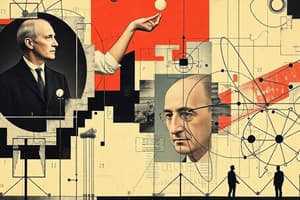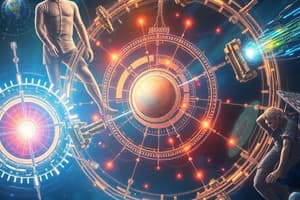Podcast
Questions and Answers
What does Newton's Second Law state?
What does Newton's Second Law state?
- The acceleration of an object is directly proportional to the force acting on it. (correct)
- An object will remain at rest unless acted upon by a force.
- Energy cannot be created or destroyed.
- For every action, there is an equal and opposite reaction.
What is the unit of energy in the SI system?
What is the unit of energy in the SI system?
- Newton
- Kilogram
- Joule (correct)
- Watt
What principle does the First Law of Thermodynamics illustrate?
What principle does the First Law of Thermodynamics illustrate?
- Energy can be created or destroyed.
- Systems move towards equilibrium spontaneously.
- Energy cannot be created or destroyed. (correct)
- Entropy of a system can decrease.
Which of the following is a branch of physics that studies heat and energy?
Which of the following is a branch of physics that studies heat and energy?
What does the equation for Kinetic Energy represent?
What does the equation for Kinetic Energy represent?
According to the Zeroth Law of Thermodynamics, what can be inferred when two systems are in thermal equilibrium with a third system?
According to the Zeroth Law of Thermodynamics, what can be inferred when two systems are in thermal equilibrium with a third system?
In which branch of physics does the study of electric charges and magnetic fields fall?
In which branch of physics does the study of electric charges and magnetic fields fall?
What is the primary focus of Quantum Mechanics?
What is the primary focus of Quantum Mechanics?
Flashcards are hidden until you start studying
Study Notes
Fundamental Concepts in Physics
- Definition: Physics is the natural science that studies matter, energy, and their interactions.
- Branches:
- Classical Mechanics: Motion of bodies and the forces acting on them.
- Thermodynamics: Study of heat, energy, and work.
- Electromagnetism: Behavior of electric charges and magnetic fields.
- Quantum Mechanics: Physics of the very small; behavior of particles at atomic and subatomic levels.
- Relativity: Einstein's theories addressing the behavior of objects in space and time.
Key Principles
-
Newton's Laws of Motion:
- First Law (Inertia): An object at rest stays at rest, and an object in motion stays in motion unless acted upon by an external force.
- Second Law (F=ma): The force acting on an object is equal to the mass of that object times its acceleration.
- Third Law (Action-Reaction): For every action, there is an equal and opposite reaction.
-
Conservation Laws:
- Conservation of Energy: Energy cannot be created or destroyed, only transformed.
- Conservation of Momentum: The total momentum of a closed system remains constant if no external forces act upon it.
-
Thermodynamics Laws:
- Zeroth Law: If two systems are in thermal equilibrium with a third system, they are in equilibrium with each other.
- First Law: Energy cannot be created or destroyed.
- Second Law: Entropy of an isolated system always increases.
- Third Law: As temperature approaches absolute zero, the entropy of a perfect crystal approaches a constant minimum.
Key Concepts
- Force: An interaction that changes the motion of an object.
- Energy: The capacity to do work; can exist in various forms (kinetic, potential, thermal, etc.).
- Work: The product of force and displacement in the direction of the force.
- Power: The rate at which work is done or energy is transferred.
Units of Measurement
- SI Units:
- Length: Meter (m)
- Mass: Kilogram (kg)
- Time: Second (s)
- Force: Newton (N)
- Energy: Joule (J)
- Power: Watt (W)
Important Equations
- Kinetic Energy (KE): ( KE = \frac{1}{2} mv^2 )
- Potential Energy (PE): ( PE = mgh ) (where h is height)
- Ohm's Law: ( V = IR ) (Voltage = Current x Resistance)
- Wave Equation: ( v = f \lambda ) (velocity = frequency x wavelength)
Applications of Physics
- Engineering: Design and analysis of structures and machines.
- Medicine: Imaging techniques (e.g., MRI, X-rays).
- Technology: Development of electronics, telecommunications, and renewable energy sources.
- Astrophysics: Study of celestial phenomena and the universe.
Study Tips
- Understand Concepts: Focus on grasping the underlying principles rather than memorizing formulas.
- Practice Problems: Apply concepts through problem-solving to reinforce understanding.
- Visual Aids: Use diagrams and graphs to visualize complex ideas and relationships.
- Group Study: Collaborate with peers to discuss and clarify difficult topics.
Fundamental Concepts in Physics
- Physics is the natural science that explores matter, energy, and their interactions.
- Major branches include:
- Classical Mechanics: Examines the motion of bodies and the forces involved.
- Thermodynamics: Investigates heat, energy, and work.
- Electromagnetism: Studies the behavior of electric charges and magnetic fields.
- Quantum Mechanics: Focuses on the behavior of particles at atomic and subatomic levels.
- Relativity: Addresses the behavior of objects in space and time, formulated by Einstein.
Key Principles
- Newton's Laws of Motion:
- First Law (Inertia): Objects remain at rest or in uniform motion unless acted upon.
- Second Law (F=ma): Force equals mass times acceleration.
- Third Law (Action-Reaction): Every action has an equal and opposite reaction.
- Conservation Laws:
- Conservation of Energy: Energy transforms but cannot be created or destroyed.
- Conservation of Momentum: Momentum in a closed system remains constant without external forces.
- Thermodynamics Laws:
- Zeroth Law: Thermal equilibrium among three systems correlates their equilibrium.
- First Law: Energy conservation principle.
- Second Law: Entropy in an isolated system increases over time.
- Third Law: Entropy of a perfect crystal approaches a minimum as temperature nears absolute zero.
Key Concepts
- Force: Changes an object's motion.
- Energy: The capacity to perform work, existing in forms like kinetic, potential, and thermal.
- Work: Force applied over a distance.
- Power: Rate of doing work or transferring energy.
Units of Measurement
- Standard International (SI) Units:
- Length: Meter (m)
- Mass: Kilogram (kg)
- Time: Second (s)
- Force: Newton (N)
- Energy: Joule (J)
- Power: Watt (W)
Important Equations
- Kinetic Energy: ( KE = \frac{1}{2} mv^2 )
- Potential Energy: ( PE = mgh )
- Ohm's Law: ( V = IR ) (Voltage = Current x Resistance)
- Wave Equation: ( v = f \lambda ) (Velocity = Frequency x Wavelength)
Applications of Physics
- Engineering: Fundamental for designing and analyzing structures and machines.
- Medicine: Vital for imaging techniques such as MRI and X-rays.
- Technology: Drives development in electronics, telecommunications, and renewable energy.
- Astrophysics: Researches celestial phenomena and the universe's workings.
Study Tips
- Grasp underlying principles rather than rote memorization of formulas.
- Reinforce understanding through practice problems.
- Use visual aids like diagrams and graphs for complex ideas.
- Collaborate in group studies to discuss and clarify challenging topics.
Studying That Suits You
Use AI to generate personalized quizzes and flashcards to suit your learning preferences.




